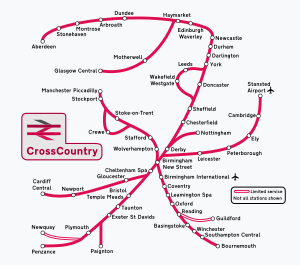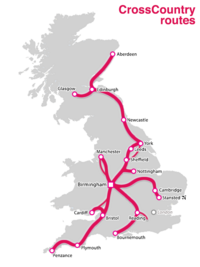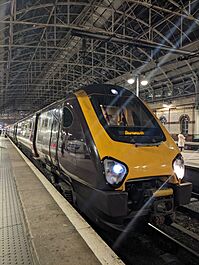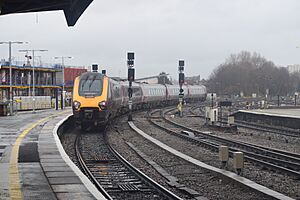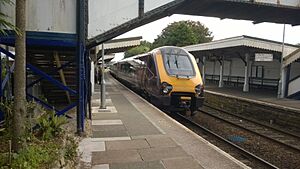CrossCountry facts for kids
| Info | |||
|---|---|---|---|
| Franchise(s): |
|
||
| Main region(s): | |||
| Other region(s): | |||
| Fleet size: | |||
| Stations called at: | 120 | ||
| National Rail abbreviation: | XC | ||
| Parent company: | Arriva UK Trains | ||
|
|||
CrossCountry is a train company in the United Kingdom. It is owned by Arriva UK Trains. CrossCountry runs long-distance passenger trains across Great Britain. It connects many cities but does not serve Greater London.
CrossCountry is one of only two train companies that does not manage any train stations. The company's services have sometimes been affected by staff strikes. These strikes are usually about pay and working conditions. The company's agreement to run trains was set to end in March 2016. However, it has been extended several times. The current agreement is set to finish on 15 October 2027.
When CrossCountry started, it used trains called Class 220 Voyagers and Class 221 Super Voyagers from another company called Virgin CrossCountry. It also got Class 170 Turbostars from Central Trains. To carry more passengers, CrossCountry also added Class 43 power cars and Mark 3 carriages. Many of these trains have been updated to make them more comfortable for travelers.
CrossCountry's main hub is at Birmingham New Street station. It used to run the longest direct train service in the UK. This service went from Aberdeen in Scotland all the way to Penzance in Cornwall. This long journey took over 13 hours. This service ended on 16 May 2025. Now, it stops at Plymouth instead.
History of CrossCountry
How the Company Started
In June 2006, the government's Department for Transport (DfT) decided to change how some train services were run. They created a "New Cross Country" service. This new service included parts of the old InterCity Cross Country service. It also added some services from the Central Trains company.
In October 2006, the DfT asked different train companies to bid for the new Cross Country service. Four companies were interested: Arriva, FirstGroup, National Express and Virgin Rail Group. On 10 July 2007, the DfT announced that Arriva had won the bid. CrossCountry officially started running trains on 11 November 2007.
Changes to Train Routes
After CrossCountry took over, it kept the old train schedules for a few weeks. Then, on 9 December 2007, a new timetable started. Some services that went to Edinburgh Waverley and Glasgow Central were given to other train companies.
The company also stopped running services to Gatwick Airport and Brighton in December 2008. Because of these changes, CrossCountry trains now do not go into Greater London at all.
Since December 2008, a daily train service from Nottingham to Bournemouth was added. In December 2010, some services from Newcastle were extended to Southampton Central. In May 2011, some trains from Edinburgh were extended to Glasgow.
During the COVID-19 pandemic, CrossCountry reduced its services because fewer people were traveling. From 15 June 2020, passengers and staff had to wear face coverings on public transport in England, including CrossCountry trains.
Extending the Company's Agreement
CrossCountry's original agreement was supposed to end on 31 March 2016. However, it was extended several times. In September 2023, the DfT announced that the agreement was extended for another four years. This means CrossCountry will continue to run trains until 15 October 2027. This new agreement includes plans to update the current trains. It also allows for possibly adding more trains.
Staff Strikes
In November and December 2017, some CrossCountry staff went on strike. These strikes were about staff working hours, especially on Sundays. More strikes were planned for January 2018, but they were cancelled after an agreement was reached.
Later, another union threatened strikes in January 2018. This was because CrossCountry staff were offered a smaller pay rise than staff at other train companies owned by Arriva. These strikes were also cancelled after CrossCountry agreed to match the pay rise.
CrossCountry has also been affected by the national railway strikes that started in 2022. These were the first national rail strikes in the UK in 30 years. CrossCountry could only run a very small number of trains on strike days.
Train Performance Concerns
In August 2024, Louise Haigh, who was the Secretary of State for Transport at the time, said she was worried about CrossCountry's performance. She said the company had too many train cancellations. She also criticized their request to run fewer trains for three months. She approved the request only to give passengers more certainty about which trains would actually run. She warned that she would take more action if the company did not improve. CrossCountry said the reason for fewer trains was a delay in training new drivers.
CrossCountry Services
CrossCountry runs medium and long-distance train services. These services do not go into the London area. The main hub for all services is Birmingham New Street. Services are generally divided into two types:
- Inter-City: These are long-distance, fast trains. They connect the South of England with the North of England or Scotland, usually through Birmingham. These trains are typically Voyager sets.
- Regional: These are medium-distance trains that make more stops. They run between Birmingham and other cities in the Midlands. Some also go to Wales and East Anglia. These trains are usually Turbostars.
CrossCountry's website shows these two types of services. However, it does not use the exact names "Inter-City" and "Regional."
Main Routes
As of May 2025[update], here are some of the main routes and how often trains run on weekdays:
| South West to Manchester and Scotland | |||
|---|---|---|---|
| Route | tph | Calling at | |
| Plymouth – Edinburgh Waverley | 1 |
|
|
| Bristol Temple Meads – Manchester Piccadilly | 1 |
|
|
| Bournemouth – Manchester Piccadilly | 1 |
|
|
| Reading – Newcastle | 4tpd |
|
|
| Cardiff to Stansted and Nottingham | |||
| Route | tph | Calling at | |
| Cardiff Central – Nottingham | 1 |
|
|
| Birmingham New Street - Nottingham | 1 |
|
|
| Birmingham New Street – Stansted Airport | 1 |
|
|
| Birmingham New Street – Leicester | 1 |
|
|
These services mean that there are more frequent trains between Birmingham and other big cities:
- Wolverhampton, Stoke-on-Trent, Macclesfield, Stockport and Manchester: two trains per hour.
- Derby: at least three trains per hour.
- Sheffield, York, Darlington and Newcastle: at least one train per hour through Leeds.
- Nottingham: two trains per hour.
- Leicester: two trains per hour.
- Leamington Spa, Oxford and Reading: two trains per hour.
- Cheltenham: three trains per hour.
- Bristol: two trains per hour.
On Sundays, the train schedule is mostly similar. However, trains usually start later in the morning or afternoon. They might also stop at slightly different stations.
Extended Services
Some services go beyond their usual end points. For example:
- From Plymouth to Penzance.
- From Bristol Temple Meads to Cardiff Central, Exeter St Davids, Paignton, Plymouth and Penzance.
- From Edinburgh Waverley to Dundee and Aberdeen.
- From Newcastle to Edinburgh Waverley and Glasgow Central.
- Some trains go through Crewe instead of, or in addition to, Stoke-on-Trent.
Until 2019, CrossCountry also ran a few services to Newquay in the summer. This was to help holiday travelers get to the coast. These services did not restart after the COVID-19 pandemic.
Special Train Services
CrossCountry ran special services from Bournemouth to Weymouth for the 2012 Olympics and Paralympics. These trains ran express, meaning they made very few stops.
Stations Only Served by CrossCountry
CrossCountry does not manage any train stations itself. However, it is the only train company that serves some stations. For example, five stations are managed by East Midlands Railway. Three stations are managed by West Midlands Trains. At Tamworth station, CrossCountry trains use the high-level platforms. The whole station is managed by West Midlands Trains. Similarly, at Worcestershire Parkway, CrossCountry uses the low-level platforms. This station is managed by Great Western Railway.
CrossCountry Trains
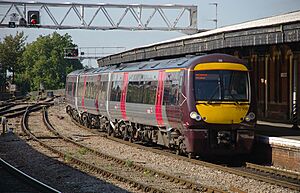
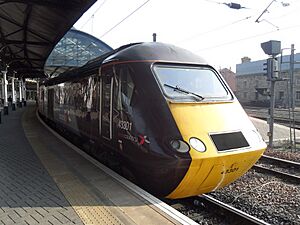
CrossCountry only uses diesel trains. This is because none of its routes have electric power lines for trains.
CrossCountry received 34 four-car Class 220 Voyagers and 44 Class 221 Super Voyagers from Virgin CrossCountry. It also got 29 Class 170 Turbostars from Central Trains.
In December 2007 and December 2008, some Class 221 Super Voyagers were moved to Virgin Trains West Coast.
CrossCountry also bought ten Class 43 power cars and forty Mark 3 carriages. These trains were updated and put back into service.
Between 2008 and 2009, both the Class 220 Voyagers and Class 221 Super Voyagers were updated. This work included removing the shop area to add more seats and luggage space. Later, the train interiors were refreshed with new seat covers.
In 2021, six of the two-carriage Class 170 trains were made longer. This happened because extra carriages became available from another train company.
In September 2023, it was announced that seven Class 221 "Super Voyagers" would be moved from Avanti West Coast to CrossCountry. This happened after CrossCountry stopped using its older HST trains. In March 2024, five more Class 221 Super Voyagers were transferred. All of CrossCountry's Voyager and Turbostar trains will also be updated.
Current Trains Used
| Family | Class | Image | Type | Top speed | Number | Carriages | Built | |
|---|---|---|---|---|---|---|---|---|
| mph | km/h | |||||||
| Bombardier Turbostar | 170 |   |
DMU | 100 | 160 | 7 | 2 | 1998–2002 |
| 22 | 3 | |||||||
| Bombardier Voyager | 220 Voyager |  |
DEMU | 125 | 200 | 34 | 4 | 2000–2001 |
| 221 Super Voyager |  |
4 | 4 | 2001–2002 | ||||
| 23 | 5 | |||||||
 |
||||||||
Past Trains Used
The last InterCity 125 trains were stopped from service on 18 September 2023. The very last service was from Plymouth to Leeds.
| Family | Class | Image | Type | Top speed | Number | Carriages | Built | |
|---|---|---|---|---|---|---|---|---|
| mph | km/h | |||||||
| InterCity 125 | 43 | 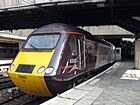 |
Diesel locomotive | 125 | 200 | 12 | 2+7 | 1976–1982 |
| Mark 3 |  |
Passenger carriage | 40 | 1975–1988 | ||||
See also
 In Spanish: CrossCountry para niños
In Spanish: CrossCountry para niños
 | Sharif Bey |
 | Hale Woodruff |
 | Richmond Barthé |
 | Purvis Young |


